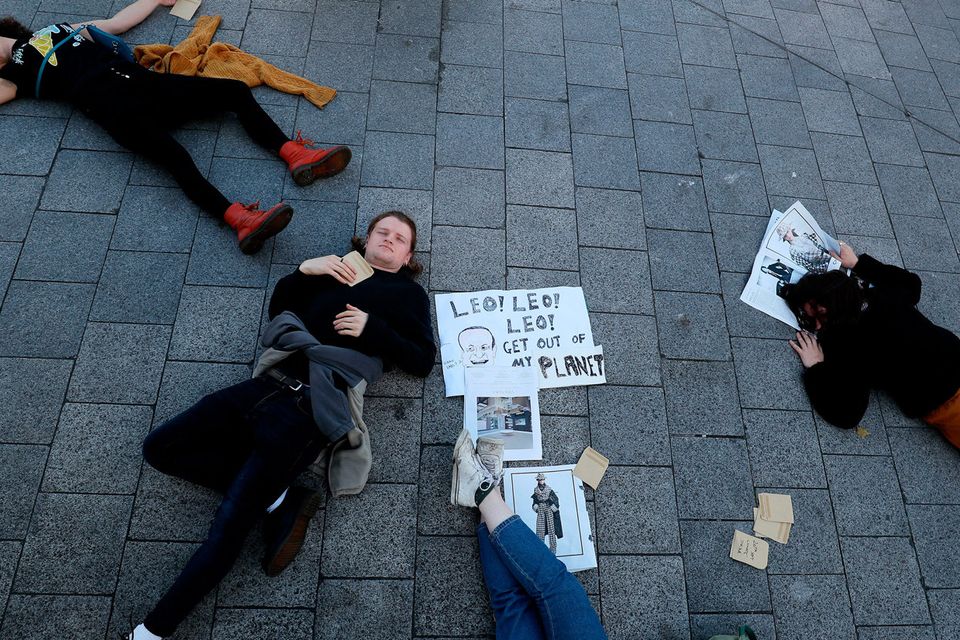Pretenders? The truth about Ireland's grand plan to go green
Ireland will strut into next week’s UN Climate Summit with a newly-baked Climate Action Plan, but our standing as budding eco-heroes isn’t as sound as ministers imagine, writes environment correspondent Caroline O’Doherty
Protests: activists from Climate Action Dublin Bay South stage a die-in in Ranelagh, Dublin ahead of the Global Climate Strike which runs until September 27. Photo by rian Lawless/PA Wire
The invitation was short and to the point. As the world’s top diplomat, secretary-general of the United Nations António Guterres can do pomp and procedure with the best of them but this time he wasn’t standing on ceremony.
“Don’t come with a speech,” he told world leaders. “Come with a plan.”
That was in March when Guterres announced he was calling a summit to try to inject fresh impetus into flagging global carbon-reduction efforts.
Climate change is close to his heart. His native Portugal has suffered extreme heat, terrifying wildfires and appalling loss of life in the last few years.
But this is not just personal — it’s critical. The landmark Paris Agreement signed by 195 nations, committing them to keeping the global temperature rise to below two degrees, is not yet four years old and already it is proving insufficient.
Even if every pledge made by every signatory is honoured and implemented, the world still faces a three degree temperature rise by 2100 or sooner, with catastrophic consequences for many countries and no nation left entirely unscathed.
Hence the request — or command — from Guterres to attend Monday’s summit in New York.
Ireland has accepted the invitation with enthusiasm, the Taoiseach himself travelling to the event along with Tánaiste Simon Coveney and Climate Action Minister Richard Bruton.
That’s because we have a plan, the Climate Action Plan, fresh out of the oven last June and brimming with good intentions.
If the summit can be seen as a kind of pot-luck picnic, then Ireland is bringing a dish that will be a talking point among the diners.
Others won’t have much to bring to the table — hiding under heavy lids, a selection of undercooked plans, plans lacking key ingredients, plans made without asking whether their public would swallow them. Professor Peter Thorne, climatologist at Maynooth University, says the recipe used by Ireland in creating our national plan will draw interest and praise.
“It’s the result of a very spectacular set of events — the Citizens’ Assembly, the Oireachtas Joint Committee, all-of-government agreement,” he says.
“We are world-leading in participatory democracy and all-party consensus and there are a lot of positives to be taken from that — not necessarily in our achievements to date but in setting out our policy and path to achievement.”
But it’s hard to overlook our achievements, or rather the lack thereof, because Ireland goes into the summit as, in the words of Leo Varadkar last year, climate laggards.
We have an EU-allocated target of reducing our greenhouse gas emissions by 20pc below 2005 levels by next year. With less than three months to go, we’ve managed a reduction of 1pc.
Per head of population, we’re the third biggest carbon polluters in the EU and we’re going to have to buy millions of euro worth of carbon credits annually to make up for our failings if we don’t start shaping up very soon.
That’s where the Climate Action Plan comes in with its 183 individual actions aimed at righting the wrongs of the past and putting us on a path to achieving our next EU target of a 30pc reduction in emissions by 2030.
It’s a very tall order given our past performance, and Prof Thorne is not convinced the task will get the level of attention it needs.
“It would be churlish not to recognise that the action plan is very significant but it’s just a plan,” he says.
“Words are cheap, actions are where it matters — and actions in the context of the real world where Brexit and all kinds of other things get in the way.”
Brexit aside, there are other concerns for the plan. It may be only freshly produced, but under scrutiny from the environmental lobby — and in particular the lobby’s very large and vocal youth wing — it already looks a bit stale.
Guterres has some very specific challenges to put to his invitees, but he is also allowing NGOs to use the summit as a platform to add their own.
We don’t have to worry about all of them. Guterres’s call to end the building of new coal plants, for example, is directed mainly at China.
There isn’t a huge emphasis on farming practices either, which is lucky for the ministerial trio given Ireland’s devotion to building up dairy and cattle herds, the overwhelming source of greenhouse gas emissions in the agricultural sector which is responsible for almost a third of all the country’s entire carbon output.
NGOs attending will, however, try to bring attention to this particular foible — and the failure of the climate action plan to address it in a substantial way.
Catherine Devitt of the Stop Climate Chaos coalition certainly hopes that point can be made. “The plan failed to deliver any detailed, comprehensive plan for a more sustainable approach to land-use management,” she says.
Other demands will not be easy to duck and will test whether we really have a substantial and sustaining carbon-reduction strategy in our action plan or if it only serves as a first course.
Raising ambition
Whatever carbon-reduction targets countries have already committed to, they’re being asked to raise them.
Guterres wants the EU to collectively aim for a 55pc reduction by 2030, up from the current target of 40pc, and to become the world’s first carbon-neutral continent by 2050.
Ireland supports the 2050 goal but has not backed the tougher 2030 target. Caoimhe de Barra, CEO of Trócaire, says Monday’s summit is the time to do so.
“The Taoiseach has a huge opportunity to show that his intention to throw off Ireland’s reputation as a climate laggard is more than rhetoric,” she says.
Catherine Devitt agrees. “The science is clearly telling us now that we need to go further, faster and deeper.”
Minister Richard Bruton had no new promises to make on this issue before his departure, stating only that: “We will be part of the net zero ambition that the EU wants to adopt [in 2050].”
Pass or fail? Will that response pass or fail the summit test? At the moment it’s right on the line with an opportunity to go either way on Monday.
Ending oil and gas exploration
Within weeks of the Dáil declaring a climate emergency last May and enjoying international acclaim for doing so, the State issued new licences for oil and gas exploration, thus breaking the first rule of the climate action movement — keep it in the ground.
If that put a tilt on the Government’s newly acquired halo, then the next move knocked it clean off.
Using the controversial ‘money message’ procedure that allows the Government to block debate on a bill if it adds to public spending, draft legislation put forward by People Before Profit to put an end to the issuing of licences was killed off.
The Government cites fears over energy security and legal threats by an oil company, but activists say the move reeks of hypocrisy and reduces the emergency declaration to hype-ocrisy.
“The Government narrative around communities and individuals doing their bit on climate action is being completely undermined while we see the continuing issuing of licences to companies to explore and extract fossil fuels off the Irish coast,” says Catherine Devitt.
Pass or fail? It’s hard to judge this as anything other than a fail.
Ceasing gas pipeline and port expansion
LNG (liquid natural gas) is gas cooled down to liquid form for ease of transport and storage and Ireland’s first LNG terminal is earmarked for the Shannon estuary in north Co Kerry.
The project has planning permission but Friends of the Irish Environment (FIE) sought a High Court review and the European Court of Justice has been asked to clarify some legal points.
Shannon LNG, the company behind the project, is American and plans to import gas from the US. The gas will be fracked and Ireland has outlawed fracking, and it is a fossil fuel that we are supposed to be phasing out.
Pass or fail? While the legal battle has yet to be decided, on policy and principle alone, this looks very much like a fail.
Grounding airport expansion
Greta Thunberg’s journey to the UN summit by sailboat has brought unprecedented focus on the contribution of aviation to global warming.
This at a time when Dublin Airport is in the midst of a €2bn expansion. FIE went to court with this project too and, although they lost, they were delighted with a section of the judgment that declared, for the first time in Irish law, that living in a healthy environment was a human right.
Pass or fail? That’s not enough, however, to rescue Ireland from another fail.
Ending fossil fuel subsidies
Ireland supports fossil fuel industries and other high-carbon, environmentally damaging activities to the tune of around €4bn a year.
Social Justice Ireland compiled the figure from a combination of direct supports such as the fuel allowance for low-income families and aid to farmers in the dairy and beef sectors, and from indirect supports such as foregone revenues from lower VAT and excise on fossil fuels and fertilisers.
Our generous corporate tax rate also benefits companies such as CMC Coal Marketing, the Dublin-based international distributor for coal from one of the world’s largest mines, the Cerrejón mine in Colombia, which generated €2.3bn in revenues for CMC in 2017. Removing, or redirecting, those supports would require a wide range of actions and legal and policy changes so it’s not an easy demand to make and not easy to judge Ireland’s performance.
Pass or fail? Probably it’s fair to say it’s a test not yet confronted.
Taxing pollution, not people
Carbon taxes are on every finance minister’s lips, including our own, and Ireland can safely go to the summit declaring we’re on the case with a €20 per tonne levy already in place and annual increases planned to reach €80 by 2030.
But they can be a crude policy tool and while additional taxes should raise prices which deter people from consuming the targeted product which hits the producers where it hurts, many people don’t have much choice when it comes to heating their homes and fuelling their cars.
So as they keep consuming and paying more for the privilege, the pollution keeps growing and there’s no reason for the producers to change their ways.
The Government has said repeatedly it will divert the extra revenue from increased carbon taxes to ensure low-income households do not suffer from higher prices and will support initiatives to give consumers low-carbon options.
A public consultation process took place over the summer seeking views around how to fulfil those aims but no concrete plan has yet been revealed.
Pass or fail? On statements and intentions, that’s a pass. Budget day next month, and all the years to 2030, will reveal whether we can maintain that status.
Engaging the public
Ireland’s star hangs high on this point, primarily because of the route to the Climate Action Plan, but the country’s youth don’t feel heard or heeded.
Together with the Marshall Islands, Ireland’s delegation has been asked to host youth engagement events around the special Youth Climate Summit taking place today so there’s a chance to improve relations and restore a little faith. With Greta Thunberg in New York for the summit, the youth events will get plenty of attention and the Irish delegation are keen to be part of it. For the good of youth, of course. So that’s a decent pass.
No doubt the ministers heading for the Big Apple this week would feel they’re being judged too harshly. Minister Bruton robustly defended the Climate Action Plan before his departure, but he did stress that it wasn’t a finite document.
“This is a very substantial step-up from an Irish perspective and I’ll get a chance to present that, but also to learn from others as to what they’re doing because our plan is a rolling plan, and if there are good ideas coming from such international conferences, I’ll be integrating those into our actions,” he said.
Professor John Fitzgerald, chair of Climate Change Advisory Council, meanwhile, is pragmatic. While concerned about weaknesses in the plan, he is wary of piling on too many additional demands. “The first thing I want to see is that we will meet the existing targets,” he says. “I actually am enthusiastic about the manner of planning for net zero by 2050 but emissions are going up. We need to see it turned down and going in the right direction.”
Overall verdict? We haven’t failed, but the chances to prove we can pass the test that climate action requires are fast running out.
Join the Irish Independent WhatsApp channel
Stay up to date with all the latest news















